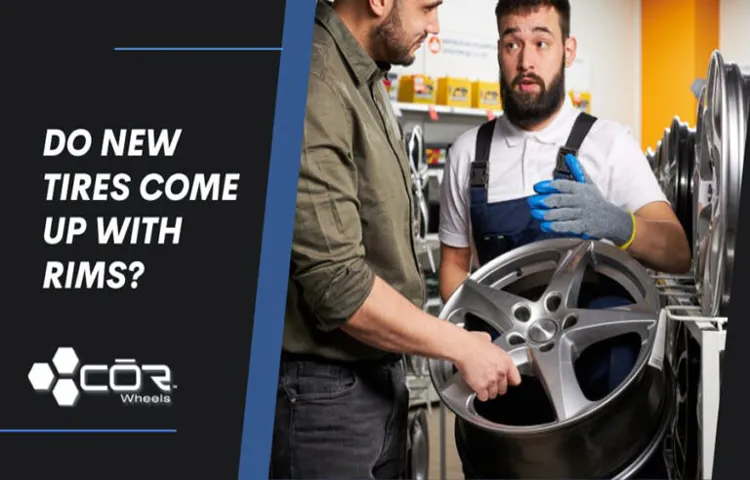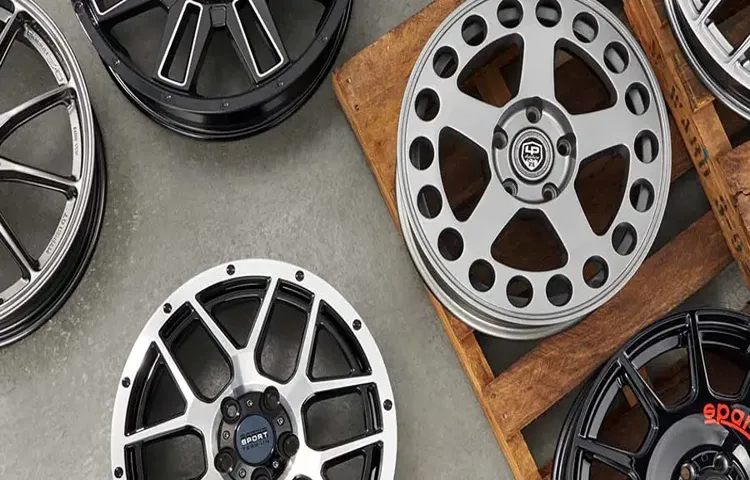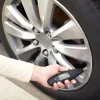Have you ever considered upgrading your tires or rims, but found yourself unsure of where to start? Are you confused about whether you need to purchase them separately or if they come as a set? Don’t worry, you’re not alone! Many people are uncertain about how to purchase these crucial components for their vehicles, and it can be overwhelming to navigate the various options and configurations available on the market. To start, let’s break down the basics: tires and rims are, in fact, two separate components, but they work together as a crucial system to keep your vehicle running safely and efficiently. Tires are the outer rubber layer that come in contact with the road, providing traction and absorbing shock.
Rims, on the other hand, are the metal or alloy wheels that attach to your vehicle and hold your tires in place. While it’s possible to purchase tires and rims separately, manufacturers and retailers often offer them as a package deal for a variety of reasons. For example, pairing certain types of rims with specific tires can optimize performance and provide a better driving experience.
Additionally, purchasing them together can often result in cost savings, as retailers often offer discounts or bundle options. When shopping for tires and rims, it’s important to consider your specific needs and preferences. For example, if you live in an area with snowy or icy conditions, you may want to look for tires with specific rubber compounds or tread patterns that are optimized for winter driving.
Similarly, if you’re looking to enhance the aesthetic of your vehicle, you may want to prioritize finding rims that match your desired style. At the end of the day, tires and rims are two crucial components that work together to keep your vehicle running smoothly. While they can be purchased separately, there are advantages to buying them in a package deal.
By considering your individual needs and preferences, you can find the right tires and rims to enhance your driving experience and keep your vehicle performing at its best.
Table of Contents
What You Need to Know About Buying Tires
A question that many people have when it comes to buying tires is whether or not they come with the rim. The answer to this question is no, tires are sold separately from the rims. This means that if you need new tires, you’ll also need to purchase new rims separately, or have your old tires mounted on your existing rims.
While some tire retailers may offer deals on both tires and rims, it’s important to keep in mind that these items are not typically sold as a package deal. It’s also worth noting that there are many different types of rims available, so it’s important to do your research and choose the right ones for your vehicle. When purchasing tires, make sure to also check the tread wear rating, speed rating, and load capacity to ensure that you are buying the right tires for your specific vehicle and driving needs.
Tires vs. Rims
When it comes to buying tires, there are a few things you need to keep in mind. First of all, it’s important to know the size of your current tires so that you can get the right replacement. Make sure to check the markings on the sidewall of your tire, where you’ll find a series of numbers and letters (e.
g. P215/60R16). This will tell you the width, aspect ratio, and diameter of your tire.
Another important factor to consider is the type of tire you need. Are you looking for all-season, summer, or winter tires? Each type of tire has different features that make it more suitable for certain weather conditions. And let’s not forget about the importance of proper tire maintenance.
Regularly checking your tire pressure, tread depth, and alignment can help extend the life of your tires and keep you safe on the road. Remember, your tires are what connect you to the road, so investing in a good set is crucial for your safety and performance on the road.

Types of Tires
When it comes to buying tires, there are a few key things you need to know to make the right purchase. One of the most important considerations is the type of tire you need. There are several different types of tires, and each has its own strengths and weaknesses.
For example, all-season tires are a great choice if you live in an area with mild weather and don’t want to switch out your tires every year. However, if you live in an area with heavy snow and ice, you’ll want to consider snow tires, which are designed for superior traction in cold, slippery conditions. Another option is performance tires, which are ideal for drivers who prioritize speed and handling.
No matter what type of tire you choose, be sure to consider factors like durability, noise, and comfort, as well as your own driving habits. With the right tire and the right mindset, you can hit the road with confidence and peace of mind.
Understanding Rims
Many people wonder if a tire purchase includes a rim. The answer is no, a tire purchase typically does not come with a rim. A rim is a separate part of the wheel assembly that connects the tire to the vehicle.
Rims are available in many styles, sizes, and materials, so it is important to select the correct rim for your vehicle and driving needs. When shopping for rims, it is important to consider factors such as material, size, and style, as well as compatibility with your specific vehicle and tire. If you are unsure about which rims to choose, it is always best to consult with a professional or seek advice from online forums or reviews.
By understanding the different options available and choosing the right rim for your vehicle, you can enhance both the performance and appearance of your ride.
What Are Rims?
Rims are the outer circular part of a wheel that hold the tire in place. They are made of different materials and come in various sizes and styles. Understanding rims is essential if you want to customize your vehicle’s appearance or enhance its performance.
The size of the rim determines the size of the tire that can be fitted on it. A larger rim size can improve handling and performance but may sacrifice ride comfort. The style of the rim can also affect the vehicle’s appearance, with options ranging from simple and understated to flashy and bold.
When selecting rims, it’s crucial to consider factors such as weight, durability, and compatibility with the vehicle’s braking system. Proper care and maintenance of rims can help increase their lifespan and ensure optimal performance. So, whether you’re a car enthusiast or simply looking to upgrade your wheels, knowing the basics of rims is a must.
Types of Rims
When it comes to customizing the appearance of your car, one of the most popular options is upgrading to new rims. Rims encompass the outermost part of your wheels, and they can come in a wide variety of styles and materials. First, there are steel rims, which are strong and durable but tend to be heavier than other types.
Alloy rims, on the other hand, are typically lighter and more aesthetically pleasing, but they may not be as strong as steel rims. Another option is chrome rims, which offer a shiny, reflective finish that can really make your car stand out. Lastly, there are forged rims, which are made through a special process that results in an even stronger and more lightweight final product.
With so many options to choose from, it’s important to think carefully about your priorities in terms of style, performance, and overall cost.
Factors to Consider When Buying Rims
When it comes to upgrading your car, rims play a significant role in not only enhancing its appearance but also improving its performance. However, buying the right set of rims can be a daunting task if you don’t understand what you need. Rims, also known as wheels, come in various sizes, materials, and designs that can affect your driving experience.
One crucial factor to consider is the rim’s size, which determines the type of tires you can use. Besides, the material of the rim affects its durability and weight, which can affect your car’s handling and fuel efficiency. You can choose from different rim finishes, such as polished, painted, and chromed, depending on your style preference.
Ultimately, understanding the basics of rims can help you make an informed decision when buying one that fits your car’s make and model.
Does Buying a Tire Include a Rim?
One question that often pops up when people are buying new tires is whether or not they come with rims. The short answer is that it depends on where you buy them from. In most cases, when you purchase a new tire, you’re only buying the tire itself.
The rim, on the other hand, is sold separately. However, some tire shops or online retailers may offer packages which include both the tire and the rim, so it’s important to do your research and ask questions before making a purchase. If you’re not sure whether a package includes a rim or not, don’t hesitate to ask the salesperson or customer service representative.
At the end of the day, it’s better to be informed and certain before making a purchase, rather than being left with unwanted surprises later on.
Typical Tire Purchases
When it comes to purchasing tires, it’s important to understand exactly what you’re getting. Many people wonder if buying a tire includes a rim, and the answer is no. A tire purchase typically only includes the tire itself.
However, it’s important to note that some stores may offer tire and rim packages, which would include both the tire and the rim. If you’re in need of both a new tire and rim, it may be worth looking into these packages to see if you can save some money. Additionally, it’s important to ensure that the new tire you’re purchasing is compatible with your current rim.
This can be determined by checking the size and type of tire that your vehicle requires. Ultimately, taking the time to fully understand what your tire purchase includes will ensure that you’re getting exactly what you need for your vehicle.
Exceptions to the Rule
When it comes to buying tires, one question that often arises is whether the purchase includes a rim or not. The answer really depends on the specific situation and the retailer you are buying from. In most cases, when you purchase a tire, you are only buying the tire itself, and the rim is sold separately.
However, there are exceptions to this rule. Some retailers may bundle the tire and rim together as a package deal, while others may offer free installation of the tire onto your existing rim. It’s important to read the product description carefully or ask the retailer directly to clarify whether a rim is included or not.
Keep in mind that rims can vary in size, material, and design, so choosing the right one for your tire is crucial for optimal performance and safety on the road.
Conclusion
In the never-ending battle of the tire and the rim, the question remains: do they come as a package deal? Well, my fellow inquisitive minds, the answer is not as simple as a yes or no. While some tires may come with rims as part of a package deal, others may require you to purchase the rim separately. So, before you hit the road with a flat, be sure to do your research and find the perfect tire and rim combo for your ride.
After all, you don’t want to be caught spinning your wheels (or worse, rolling on rims alone) when you could be cruising in style with a perfectly matched set. Choose wisely, my friends.
FAQs
What is included when you buy a tire?
When you buy a tire, it typically does not come with the rim.
Can you purchase a tire and rim together?
Yes, you can purchase a tire and rim together as a package deal.
Will any rim fit any tire?
No, different tires and rims have different sizes and specifications, so it is important to ensure that the tire and rim are compatible.
Do I need to replace both tire and rim if one is damaged?
It depends on the severity of the damage. If the damage is minor, only the affected component may need to be replaced.
Can I use different brands of tires and rims together?
It is not recommended to mix and match different brands of tires and rims as they may not be compatible.
How do I know which size tire and rim to purchase?
You can refer to your vehicle’s manual or consult a professional to determine the appropriate size for your vehicle.
Do I need to have my tires and rims balanced?
Yes, it is important to have your tires and rims balanced to ensure proper handling and to extend the life of the components.



